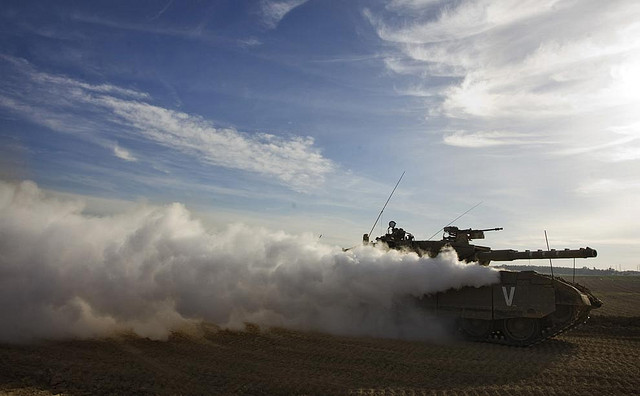The ‘peace-loving nation’ of Israel is yet again at the brink of an existential annihilation due to home made rocket attacks from Gaza — or so they would have you believe. As the Israel-Palestine conflict rages, we’ve heard the same boiler plate statements about ‘Israel’s right to defend itself’ and ‘No country would tolerate rocket attacks, so why should Israel?’
But why are rockets being fired into Israel in the first place? ‘Because the Palestinians are terrorists and anti-Semites.’ Perhaps, or perhaps there are few more plausible explanations for Palestinian armed resistance; consider the following:
1. The occupation
Israel, with U.S. support, has militarily occupied the Gaza Strip (along with the West Bank and East Jerusalem) since 1967. The belligerent occupation, now in its 47th year, is one of the longest, bloodiest and brutal in human history — over 2,500 Palestinians have been killed in Gaza alone in the last seven years.
Up until 2005, Israel maintained illegal Jewish colonies in the Gaza Strip as well. It has since disbanded these colonies and thus claims it’s no longer occupying the Gaza strip. Israel is alone in holding this deceptive view; the UN, US State Department, global NGO’s and legal scholars all consider Gaza a part of the Occupied Palestinian Territories because Israel exercises complete military control over it.
2. The siege
Israel, with U.S. backing, has laid a brutal siege in the Gaza Strip since 2007. It has blocked off air, land and water access to the Strip — nothing goes in, nothing comes out. Gaza has thus aptly been described as the ‘world’s largest open air prison.’
The siege has stifled the economy, destroyed the infrastructure and cut off access to some of the most basic amenities needed to live a dignified life. Today, almost 80 per cent of Gazans are dependent on aid as a result of the blockade. The UN has warned Gaza will be inhospitable by 2020 if the siege continues.
3. The water crises
Israel’s discriminatory division of water means that Palestinians get 70 litres a day per person (far below the 100 liters per capita minimum). Limiting the water supply means households in Gaza receive running water for only six-eight hours at a time about every other day. Israel severely damaged the sewage treatment infrastructure in Gaza during its 2009 assault; the blockade means the resources needed for repairs are unavailable. As a result, only 25 per cent of Gaza’s waster water is treated; 90 million liters of untreated or partially treated sewage is dumped into the Mediterranean every day. Thus, Gaza’s only water source, its Coastal Aquifer, is past the point of no return — it will expire in 2016. At present, about 90 per cent of the water supply in the Strip is contaminated and unfit for human consumption.
4. Fuel and electricity shortage
Gaza is under a chronic power shortage due to the siege; Israel has severely limited the fuel supply needed to operate the only power plant in the territory. Only 46 per cent of Gaza’s electricity needs are being met currently; this has triggered rolling power outages of 12 hours everyday on average. Amongst other things, this lack of power means that hundreds of crucial medical devices at hospital are non-functional, including Gaza’s only MRI machine.
5. Leveling of land and destruction of property
The Israeli army conducts weekly incursions into the Gaza Strip to destroy the land it has declared as ‘no-go zone.’ Its tanks, bulldozers and military jeeps, accompanied by helicopters and drones, systematically destroy fruit bearing trees and agricultural land in the Gaza strip. Civilian infrastructure in this area is also demolished; this includes hundreds of houses, wells and chicken farms — mosques and schools are demolished as well.
6. Travel bans
Israel’s siege has meant that it is virtually impossible for Gazans to leave the occupied territory. They can’t even leave to visit their relatives in the West Bank, let alone in Israel. Gazans with spouses in Israel or the West Bank are forced to live in separation; simple matters such as raising a family are rendered impracticable. Permission to leave even for severe emergencies is rarely given.
By dividing Palestinians, Israel successfully employs the ‘divide and conquer’ strategy like colonial powers of the past. The people of Gaza can’t even seek asylum in other countries due to this restriction on movement. Even students are prohibited go to the abroad, or even the West Bank, for higher education; in 2008 visas of seven winners of U.S. Fullbright Scholarships were revoked.
7. Farming restrictions
The Israeli army created a ‘no-go zone’ along the Israel-Gaza border that Palestinians cannot enter. This ‘buffer region’ extends up to 1,500 meters at times into the Strip and includes some of its most fertile land. As a result, 35 per cent of the agricultural space in Gaza is off-limits to farmers. Palestinians are fired at arbitrarily if they try to enter this region, which is often carried out from remotely controlled weapon stations. Farmers suffer serious injuries, and at times death, as a result of this indiscriminate firing.
8. Fishing restrictions
Israel has announced that access to the sea six nautical miles beyond Gaza’s shore is prohibited for fisherman. This means that 85 per cent of fishing waters granted to Palestinians under the Oslo Accords is now inaccessible; this is severely impacted Gaza’s coastal economy. Similar to the restricted areas on land, Palestinian fishermen are regularly exposed to warning fire by Israeli naval forces, their fishing boats are intercepted and they are detained — all for the harmless act of fishing.
So, in light of the above, let’s try to counter the statements coming out of the foreign affairs office: No people would ever tolerate an oppressive occupation and an unjust siege, so why should the Palestinians?
Waleed Ahmed is a freelance writer based out of Toronto. He enjoys writing about current affairs, human rights and religion.
Photo: flickr/Amir Farshad Ebrahimi



